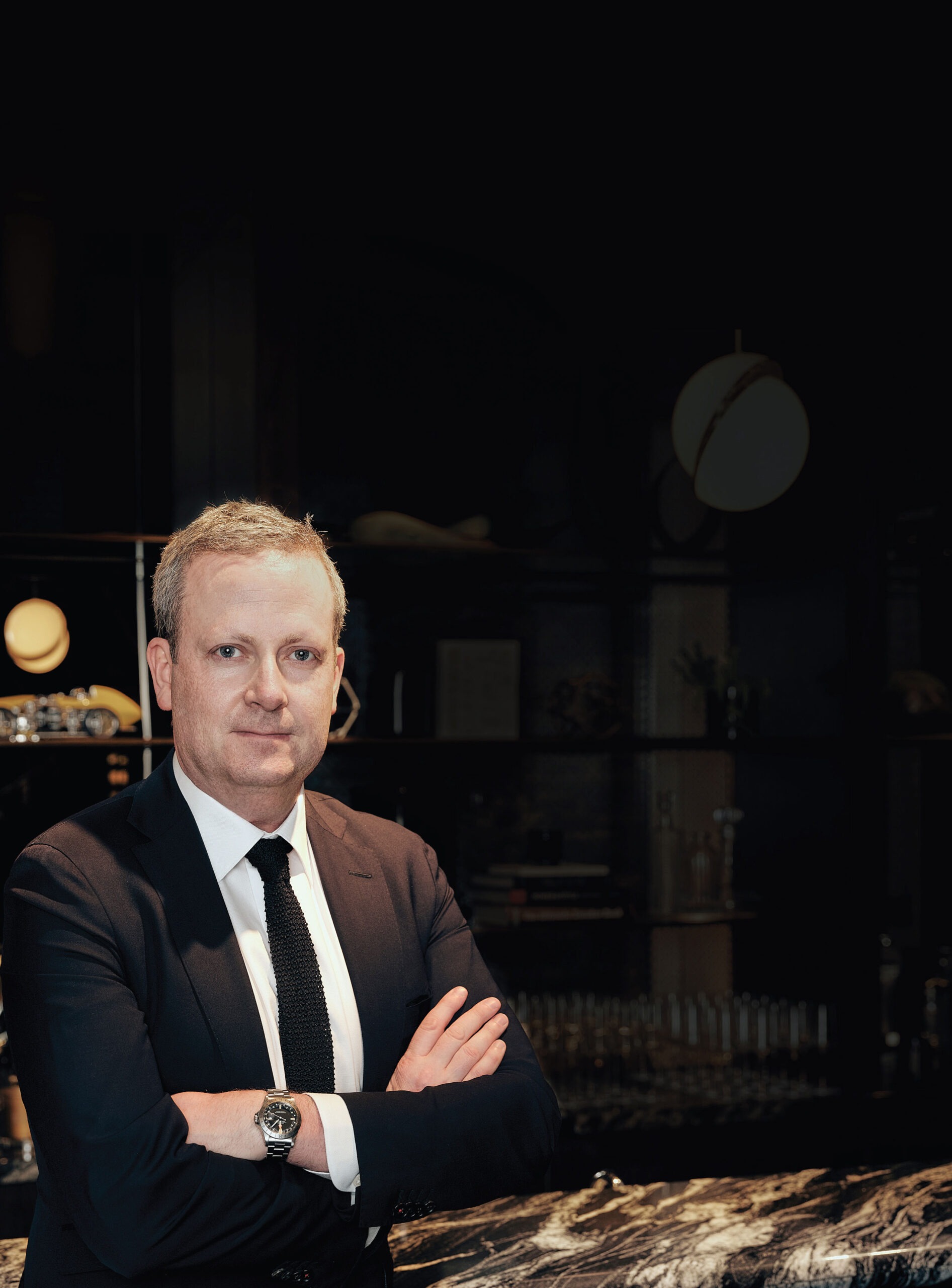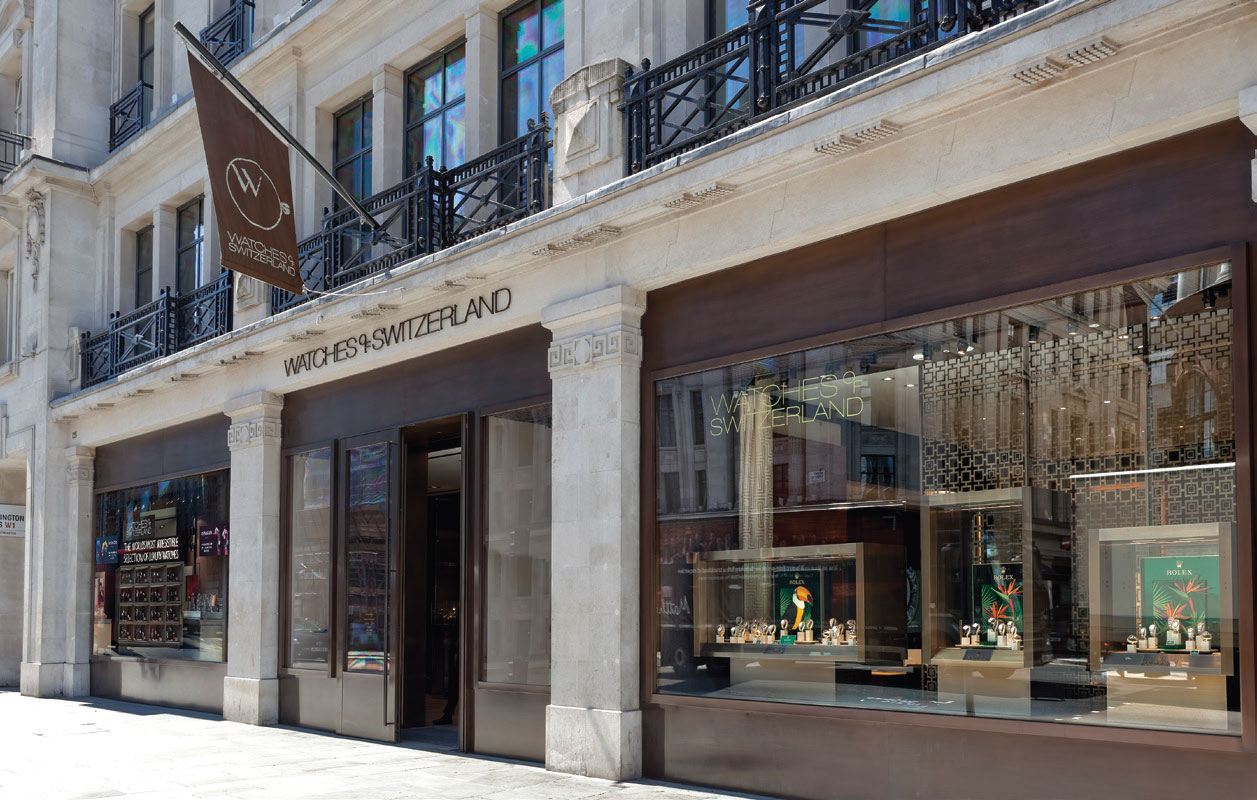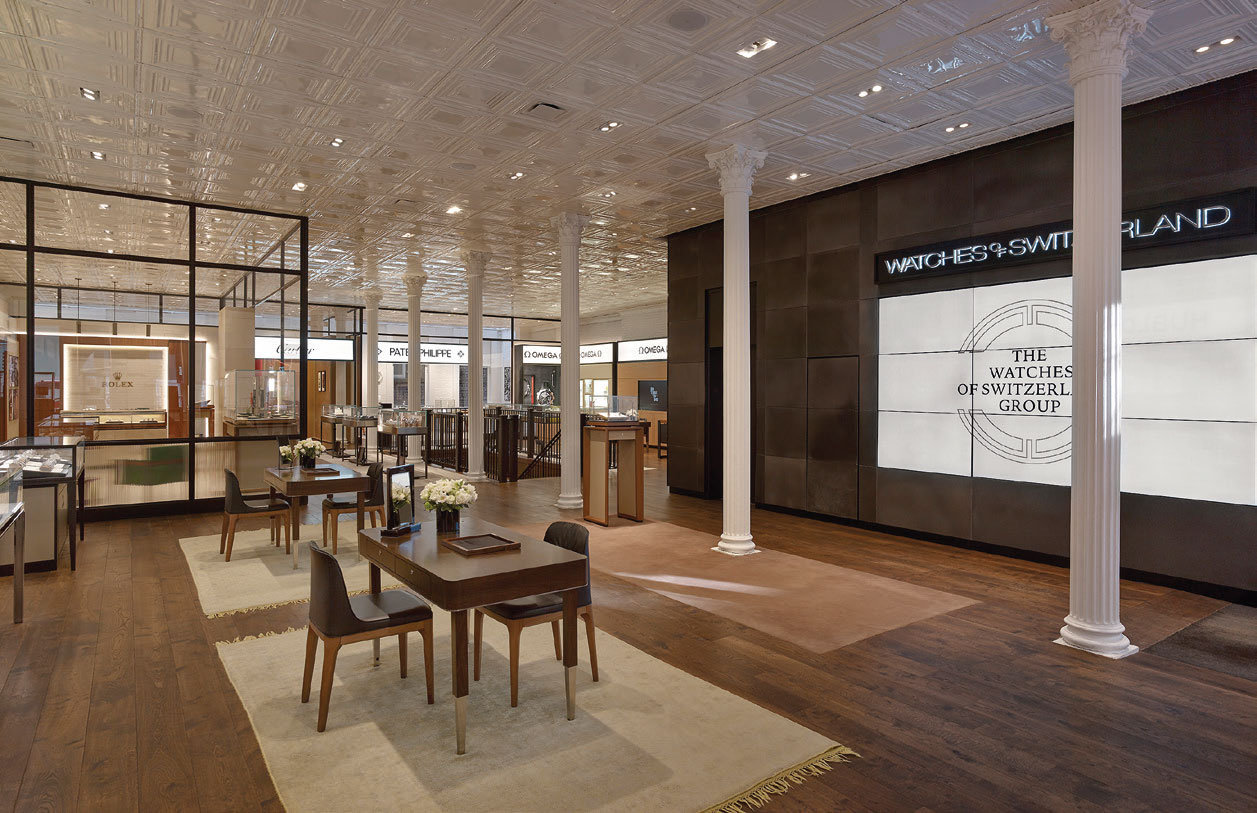For the watch lovers among us, the name ‘Watches of Switzerland’ is probably a familiar one. The group, fi rmly established across the UK and US, has major ambitions to bring a touch of class to a store – or website – near you. But as David Hurley, the company’s deputy CEO, tells Andy Tunnicliffe, the luxury market is changing fast – and from sophisticated online offerings to heightened customer service, the fi rm needs to change with it.

Though its heritage can be traced back to the 1770s, the story of Watches of Switzerland (WOS) officially started in 1924. Originally known as G&M Lane & Co, the company’s first store opened its doors at 26 Ludgate Hill in the City of London, selling what it proudly heralded as the “finest Swiss timepieces”. This was merely the latest chapter of G&M Lane & Co’s development – having until then been a mail-order supplier.

David Hurley, deputy CEO of Watches of Switzerland.
Founder Maurice Lane had a passion for ensuring clients received the highest quality products and service, an ethos the group tries to live up to today across its 171 UK and US showrooms. Thanks to a series of acquisitions and partnerships, meanwhile, the contemporary WOS estate comprises a tranche of different store types, from multi-brand flagship showrooms like Goldsmiths through mono-brand boutiques covering everyone from Cartier to Rolex to Patek Philippe.
Despite the hefty price tag of many of its offerings, the group is not about what David Hurley calls the hard sell. “It’s about the overall experience,” the deputy CEO at WOS stresses. “You’ve got to remember, we’re part of some really special moments. Whether it’s engagements, celebrating anniversaries, a promotion at work or bonus, these are big moments and we want to make sure we celebrate them appropriately with our clients.”
Luxury evolution
Hurley argues that luxury is a capital intensive business – and something that has seen significant change over the years. That’s true, he suggests, both in terms of the way clients engage with it, and how it has to present itself. “None of our stores stay the same for too long,” he says. “When I go into our flagship stores, whether it’s 155 Regent Street, in Soho, or Hudson Yards, there’s always an area of the store that’s covered up because we’re taking something out, or putting a new brand or another pop up in.”
To put it another way, Hurley believes the way things used to be – where staff would focus on building up a store’s identity before renovating the shop every decade or so – is coming to an end. This constant evolution is symptomatic of the way shopping trends are changing more broadly. The role of the department store, particularly in the UK, has diminished – not least in the luxury goods realm, where they now enjoy a much smaller market share. “There’s some department stores that are still doing incredibly well – like Selfridges and Harrods – but let’s be honest, they’re kind of anomalies,” Hurley says. But, he adds, the luxury market itself has gone through huge positive change too – especially when it comes to expanding into the virtual world.

The front of the WOS boutique in central London’s iconic Regent Street.
Not that the WOS offering is any less glamorous ensconced in ones and zeros. On the contrary, Hurley and his team are eager to offer a sophisticated experience here too: through innovative virtual boutiques. Hurley believes that as time becomes more precious – with people having less of it than ever before – the online store is proving to be a huge draw. Apart from giving potential customers the opportunity to browse, make enquiries and book appointments in a comfortable online setting, it also ensures that the personal touch is maintained between a customer’s first click and their eventual visit to a brick-and-mortar showroom.
When a client arrives in store, indeed, the online preamble means that staff are already aware of what they want, and how to meet those expectations. That begins at the door, where clients are offered a glass of champagne. “We just want to make sure that when people come into our stores, if they want to celebrate and really enjoy the experience, that we’re able to do that with them,” Hurley says. Certainly, this approach is proving to be a hit with customers, resulting in what Hurley calls a “significantly higher” level of conversion. Considering the group recently enjoyed a 25% quarterly revenue boost compared to the same period last year, he surely has a point.
How they tick, and click
This success doesn’t happen by chance. On the contrary, WOS has invested heavily in knowing its audience. In a bid to enhance the customer experience, indeed, the group quietly introduced the Xenia programme late last year. In a statement to the media at the time, it suggested it was building on its ‘reputation for delivering world class customer experience’ with Xenia – an ancient Greek concept of hospitality. Partnering with Ritz-Carlton, WOS wanted to know how it could improve levels of hospitality and follow up. “We looked at our overall end-to-end processes, broke down every single component or interaction with clients and our stores, and how it could be improved and made more efficient,” Hurley says. Clarifying this is an ongoing programme, he adds, noting that the ultimate aim is to meet ever-changing customer expectations. “Hopefully it’s one of those differentiations that we’ll have with our competitors.”
Online, where Hurley says WOS now has the vast majority of client interactions, is shaping the luxury market sector – evidenced if nothing else by where spending on marketing is ending up. “In 2005, most of the traditional advertising spend for luxury brands probably would have been spent on billboards and magazines etc. There’s been a significant shift to digital: probably 80% of spend is now online, on blogs or some other component.”
Investments in online activity across the market are clearly paying off. Quite aside from innovations like Xenia – aimed at bringing online customers into the real world, as it were – it’s estimated that by the end of 2022, WOS’s total market revenues, both on and offline, will be almost $70m. That’s up by more than 6% year-on-year. In 2015, moreover, a touch over 18% of global sales were completed via online channels. By 2025 it’s estimated that will have increased to 29.6%. More broadly, Hurley estimates that in the region of $100m of its UK business is done online each year. In the US that figure is some way off. Yet as Hurley says, it’s vital to future growth given “it’s the first place people see you and start researching the brands we carry”.

Mayors’ new White Sands, New Mexico campaign for investment quality wedding and bridal jewellery.
That focus on America is far from accidental. Five years ago, WOS made its move on the US market – which today is the second largest domestic luxury watch market behind China – and now has a stateside estate of 45 stores. Much of that expansion has been the result of a mix of acquisitions, including Mayors in 2021, as well as the opening of WOS-branded showrooms and mono-brand boutiques. Hurley says the US drive has been a success so far, a view supported by figures showing that during the third quarter of the 2022 fiscal year, US revenues were up 44.6% year-onyear, and up 72.3% over the past two years.

This WOS showroom in New York City’s Soho district was opened in 2018.
Keeping time
With a career in luxury and customer service spanning three decades, Hurley knows what it takes to provide excellence to the most discerning of clients. That understanding has developed since he began working for world-renowned clothing maker Ralph Lauren, where he held several leading roles.
As well as being animated when it comes to the quality of customer service and what his current employer represents, he also has some strong views on leadership more broadly. That’s particularly clear when it comes to his own role. While he concedes that CEOs and other major executives are often seen as the lodestar of their business, Hurley equally stresses that others can have a major impact on a business. “Sometimes it can be a fixation on the CEO,” is how he puts it. “The most important thing is actually what our teams do on a day-to-day basis, standards and how we represent those brands.”

A snapshot from a WOS pop-up store in the Hamptons.
Leadership, in short, can come from many places – something Hurley himself positively encourages. Recognising the teams WOS has on both sides of the Atlantic, he says his US colleagues aren’t afraid to push back against his suggestions if they disagree. It’s a culture he and senior colleagues – from CEO Brian Duffy down – are proud of. “If you don’t have a point of view, in our opinion, then don’t be around the table,” he says. “I certainly want to do that in respect of my CEO, telling him what I think, whether I agree or disagree, and then make a decision that we all align with.”
Quite apart from everything WOS has managed so far, this thoughtful approach to business looks set to serve the company well over the years ahead. Beyond its expansion in the US, the company has also set its eyes on the Nordic countries, with Copenhagen and Stockholm just two areas of growth. All the same, Hurley warns that he and his colleagues can never rest on their laurels. “That ability to scale and execute is hugely important,” he says. “We don’t dispute definitions in terms of how we’re going to grow: online versus offline, acquisitions versus new stores that we build.” Without wanting to finish on too obvious a pun, it therefore surely makes sense to watch this space.


